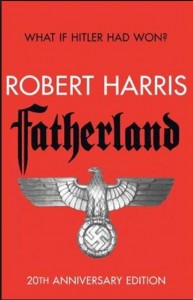 When I first picked up Robert Harris’ Fatherland in my local independent bookshop in 1992, I was fascinated by the concept of ‘what if Nazi Germany had won the war?’ What would have been the alternate path of history? When I first picked up Robert Harris’ Fatherland in my local independent bookshop in 1992, I was fascinated by the concept of ‘what if Nazi Germany had won the war?’ What would have been the alternate path of history?
Fatherland was intrinsically a political thriller. In 1992, the whole of Europe was attempting to realign after the exhilaration of the fall of the Berlin Wall in 1989 and dissolution of the East/West Iron Curtain imposed after the Second War World. Perfect timing by the astute political journalist, Robert Harris. Fatherland went on to become an best-seller immediately and ever since.
The story begins in April 1964 in a Nazi Germany which won the Second World War. It’s the week leading up to Adolf Hitler’s 75th birthday and shortly before his meeting with American president Joseph P Kennedy (JFK’s father in our world). The plot follows police detective Xavier March as he investigates the suspicious death of a high-ranking Nazi. As March uncovers more details he realises that he is caught up in a political scandal involving senior Nazi Party officials, who are being systematically murdered under staged circumstances. As soon as the body is identified, the Gestapo claims jurisdiction and shuts down March’s investigation. March meets a female American journalist who is also investigating the case. Ultimately, the two uncover the horrific truth behind the staged murders.
At its best, alternate history challenges fixed ideas while providing entertainment. In Fatherland, we enjoy the frisson of terror at the nightmare of what could have been. Readers, especially those who haven’t tried an ‘althist’ book before, are intrigued by the different setting and the ‘what if’ trope, but are still after a cracking good story with emotional grip.
Harris is a political journalist and this shows through his writing. I love his succinct, pictorial style, the inference of tension and past memory he can conjure up in a few words:
Xavier March, homicide investigator with the Berlin Kriminalpolizei – the Kripo – climbed out of his Volkswagen and tilted his face to the rain. He was a connoisseur of this particular rain. He knew the taste of it, the smell of it. It was Baltic rain, rain from the north, cold and sea-scented, tangy with salt. For an instant he was back twenty years in the conning tower of a U-boat, slipping out of Wilhelmshaven, lights doused, into the darkness.
According to Robert Harris, in an interview with The Guardian, Fatherland attracted heaviest outrage from Germans who castigated Harris for ‘trivialising’ their history; thirty publishers in Germany refused to handle the book. Das Spiegel magazine ran a six-page denunciation of Fatherland which ensured it became a bestseller in Germany.
My own ‘what if’ story was bubbling away in my head, more as a fantasy than a concrete idea for a book, but the idea of bending and extending history as Robert Harris had done planted itself beside it. It spurred me on to find other such stories such as Keith Roberts’ Pavane about an England after being defeated by the Spanish Armada, Kingsley Amis’ The Alteration and Michael Chabon’s The Yiddish Policemen’s Union. Historic novelist C J Sansom took up the ‘what if Nazi Germany had won the war’ theme in Dominion, but used ordinary people as the carriers of the narration while using the great smog of 1952 (which really happened) as a symbol of obfuscation. Clever stuff.
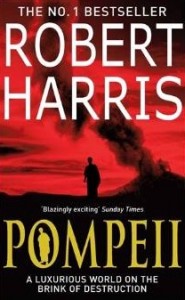 In 2003, Harris turned his attention to ancient Rome with his acclaimed Pompeii which has become another international best-seller. He followed this in 2006 with Imperium, the first novel in a trilogy about Roman orator and politician Cicero. The second novel, Lustrum, was published in October 2009 (Conspirata in the US).The third and final novel, when it does appear, is already on my to-be-read pile. In 2003, Harris turned his attention to ancient Rome with his acclaimed Pompeii which has become another international best-seller. He followed this in 2006 with Imperium, the first novel in a trilogy about Roman orator and politician Cicero. The second novel, Lustrum, was published in October 2009 (Conspirata in the US).The third and final novel, when it does appear, is already on my to-be-read pile.
Pompeii, centres on Marcus Attilius, an ordinary engineer placed in charge of the massive aqueduct that services the tens of thousands living close packed around the Bay of Naples. Quiet, expert, and stubborn, Marcus has to face the facts that his predecessor in the job vanished mysteriously and that the towns’ wells and springs around the whole bay are failing. On top of this, the greatest aqueduct in the world – the mighty Aqua Augusta – has suddenly ceased to flow. Marcus is tasked by the scholar Pliny to undertake crucial repairs to the aqueduct, all under the shadow of the restless Mount Vesuvius. For me, Harris’ genius for narrative is pronounced in this work.
He reached for the decanter but stopped, his hand poised in midair. The heavy crystal glass was not merely shaking now: it was moving sideways along the polished wooden surface. He frowned at it stupidly. That couldn’t be right. Even so, it reached the end of the sideboard and crashed to the floor. He glanced at the tiles. There was a vibration beneath his feet. It gradually built in strength and then a gust of hot air passed through the house, powerful enough to bang the shutters. An instant later, far away – but very distinctly, unlike anything that he or anyone else had ever heard – came the sound of a double boom.
Newer work includes The Ghost, a thinly disguised story of the recently unseated prime minister, Tony Blair. Harris adapted the book with Roman Polanski for a 2010 film starring Pierce Brosnan, Ewan McGregor, Olivia Williams and Kim Cattrall. For me, it echoed the political conspiracy, corruption and twisted allegiances in the Roman novels centred on Cicero.
So who is Robert Harris?
Born in Nottingham, Harris spent his childhood in a small rented house on a Nottingham council estate. His ambition to become a writer arose at an early age, from visits to the local printing plant where his father worked. Harris read English literature at Selwyn College, Cambridge, where he was president of the Union and editor of the student newspaper Varsity.
He became a columnist for the Sunday Times, but gave it up in 1997. He returned to journalism in 2001, writing for the Daily Telegraph and was named “Columnist of the Year” at the 2003 British Press Awards.
So, in conclusion, if you are looking for tight writing, excellent research and a cracking story that challenges, I don’t think you can go wrong with Robert Harris.
For me, he will always be one of the triggers for writing the world of Roma Nova.
(This is a reworked version of a guest post I wrote for Layered Pages when INCEPTIO was launched in 2013.)
Alison Morton is the author of Roma Nova thrillers, INCEPTIO, and PERFIDITAS. Third in series, SUCCESSIO, is now out.
Find out Roma Nova news and book progress before everybody else, and take part in giveaways by signing up for my free monthly email newsletter.
If you enjoyed this post, do share it with your friends!Like this:Like Loading...
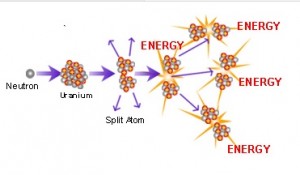 So, split the atom time. Well, as I’ve created two blogs out of one, it’s more a case of splitting the byte. So, split the atom time. Well, as I’ve created two blogs out of one, it’s more a case of splitting the byte.
Being an author today means developing entrepreneurial skills, especially marketing ones. I’m not talking about selling – although that’s ultra important – but about making people aware of your book’s, or books’, existence. It’s a slippery concept, marketing, but for me it means setting out your wares, and creating an environment that supports that.
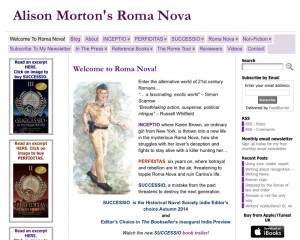 My website, originally Write A Novel? I Must Be Mad! had one main theme – a newbie’s adventures in writing-and-publishing-land, peppered with the odd post about Rome and alternative history. When my first book, INCEPTIO, came out, I changed it to Alison Morton’s Roma Nova and added in stuff about my books. My website, originally Write A Novel? I Must Be Mad! had one main theme – a newbie’s adventures in writing-and-publishing-land, peppered with the odd post about Rome and alternative history. When my first book, INCEPTIO, came out, I changed it to Alison Morton’s Roma Nova and added in stuff about my books.
Now with the fourth book, AURELIA, on the way, it’s time for another change. I asked for specialist advice. Reading the report (with a slightly sinking heart), I had to acknowledge that Alison Morton’s Roma Nova was too fuzzy and cluttered. People looking for my books got a raft of writing topics; others looking for writing and publishing kept getting Roman and Roma Nova stuff.
So I seized my own site-splitting machete to create my own ‘point of divergence’. And as in all alternative history concepts, there will be no going back. Readers need focused information from a dedicated and navigable site, so I made two.
On Alison Morton’s Writing Blog you’ll be able to find my posts about writing, independent publishing, marketing, fabulous guests, research, author-entrepreneur skills, writing life and events.
The darker Alison Morton, Author of the Roma Nova Thrillers (this site) features my books, plus photos and posts about Rome, alternative history and Roma Nova. And I have a very serious photo and tough new bio…
Alison Morton is the author of Roma Nova thrillers, INCEPTIO, and PERFIDITAS. Third in series, SUCCESSIO, is now out.
Find out Roma Nova news and book progress before everybody else, and take part in giveaways by signing up for my free monthly email newsletter.
If you enjoyed this post, do share it with your friends!Like this:Like Loading...
 This is one for the writers, but readers might be interested in a vital part of the process that goes to producing a story. I say producing, because like a piece of pottery, a story starts as a heap of dull, wet mud. Writing the first draft is like throwing that heap on to the wheel and teasing out a not-too-bad shape. After several tries, and a lot of concentration, hard work an a dollop of inspiration, you eventually have a well-shaped story which holds together, with no holes and no obvious imperfections. Now it has to be finished, decorated and glazed before firing in the publishing process. (Or do I mean kiln?) This is one for the writers, but readers might be interested in a vital part of the process that goes to producing a story. I say producing, because like a piece of pottery, a story starts as a heap of dull, wet mud. Writing the first draft is like throwing that heap on to the wheel and teasing out a not-too-bad shape. After several tries, and a lot of concentration, hard work an a dollop of inspiration, you eventually have a well-shaped story which holds together, with no holes and no obvious imperfections. Now it has to be finished, decorated and glazed before firing in the publishing process. (Or do I mean kiln?)
Writers use different finishing routes; mine always includes a professional (yes, parting with money!) report. If you are lucky enough to be a member of the Romantic Novelist’ Association’s New Writers Scheme, you will receive a massively subsidised report as part of your membership.
Professional readers can be multi-published authors, editors, creative writing tutors or literary consultants. Obviously, you will have checked out their qualifications and track record. Personal recommendation and references are vital; you are handing over your hours of hard graft, inspiration and possibly a part of your soul.
After a few weeks, the report drops into your inbox. Whether it’s the first time or the fourth time (as it is for me), the feelings of excitement and dread intermingle; did the reader ‘get’ your story? Is it a potential bestseller or a heap of crap? Are they going to suggest you take up accountancy instead?
 Make a cup of tea/coffee and open the damned thing; it’s done. This may sound hard, but nothing you feel now is going to change the report. You’ll be better off using that nervous energy in working on the revisions which result from it. But I’m getting ahead of myself – something I am told I do when I read my report. 😉 Make a cup of tea/coffee and open the damned thing; it’s done. This may sound hard, but nothing you feel now is going to change the report. You’ll be better off using that nervous energy in working on the revisions which result from it. But I’m getting ahead of myself – something I am told I do when I read my report. 😉
Let’s get practical
1. Sit quietly and read through it fairly quickly. That gets rid of anticipation and you can then read the content properly and with your writing brain rather than your emotions.
2. Then look at the structure of the report. Usually, there’s a general/introductory section at the beginning (usually with some nice words!), followed by headed sections about the chief concerns, for example, start of the story, each major character, minor characters, setting/world building, plot, then options and ways forward.
3. Reports will normally pinpoint only the weaker areas. If something isn’t mentioned or is only included in the introductory section with praise, then you’ve cracked those areas and don’t need to worry.
4. Print the report out in 1.5 spacing, or double, if you prefer. (I use up my old business letterhead for this internal stuff, so ignore the logo in the image.) Next mark up the report. You can’t use it effectively until you’ve analysed it. I underline the key words/phrases, e.g. “One of your strengths is writing action scenes.” I don’t need to underline “They are all terrific, immediate, visceral” which develops that comment, although I do go back and read it when I have an attack of self-doubt!
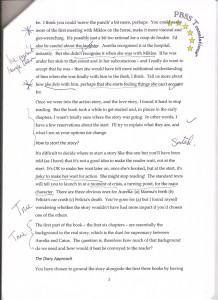 Moving on… “You have a lovely turn of phrase” I just tick that – job done. Then you read ”But I’d be careful about…” For me that’s a massive asterisk in the margin – an action point that must be addressed. I mark up things where I see the reader is right with ’True’. This alerts me to revisit that section of my manuscript. And importantly, any factual queries, I mark with ‘Check’. Doing this analysis methodically takes the sting out of any negatives identified. You are a in worker mode rather than reactor mode. Moving on… “You have a lovely turn of phrase” I just tick that – job done. Then you read ”But I’d be careful about…” For me that’s a massive asterisk in the margin – an action point that must be addressed. I mark up things where I see the reader is right with ’True’. This alerts me to revisit that section of my manuscript. And importantly, any factual queries, I mark with ‘Check’. Doing this analysis methodically takes the sting out of any negatives identified. You are a in worker mode rather than reactor mode.
5. If the reader has also annotated the text, work through those comments first, bearing in mind the overall points made in the report. A warning – you will find other things the reader hasn’t mentioned but which scream out at you now your senses are alerted. This is a great opportunity to tighten up other parts of the text and snip bits out of scenes that you now see are superfluous. And to develop scanty scenes which could contribute much more.
6.When you’ve finished that run through, have a glass of wine to celebrate. (Juice/tea/coffee as you prefer, but I need wine at this stage.)
7. Next day, sit at your keyboard and work through the general points underlined in the report. If it’s a major restructure, print out the sections/chapters concerned and work on them with a pen. You will be able to scribble, circle and arrow them much more easily than on the screen. You may even find a pair of scissors and a stapler/gluestick handy…
You may feel you’re starting all over again, but altering the detailed comments in the days before will have slotted you back into the story after a break of several weeks. I’ll ‘fess up – I had dithered around at the start of my latest manuscript, AURELIA, and had several interesting but redundant chapters at the beginning. Following the advice in my report, I consigned six chapters to the pyre, but two tighter chapters, full of tension, emotion and action, emerged from the flames.
8. No, you haven’t finished! Send the revised manuscript to your Kindle/print it out in single spacing and read it through as if it were a ‘real book’. Make notes, but don’t stop to change anything or you’ll lose the flow.
9. Incorporate changes you have spotted on your read through.
10. Send the manuscript to a trusted friend/critique partner/beta reader asking them to comment on the reader experience. They shouldn’t spot spelling, bad grammar and typos; you will have sorted out those glitches by now.
11. Final check and then send the manuscript off to the next stage, be it agent, publisher, or as I do to my copy editor before it goes to my publishing services company, SilverWood Books.
 Now is definitely time to celebrate – you’ve achieved a huge step in your book’s existence. Now is definitely time to celebrate – you’ve achieved a huge step in your book’s existence.
Sometimes, a reader report is a genuine dud, but not often. In that case, go back to the reader/organisation and set out your points logically why it didn’t meet your expectations; keep the emotion out. Out of six reports from various sources, I’ve only had one poorly produced one and even the scheme organiser thought it wasn’t very good and offered me a second one free!
A reader’s job is not to slate, target or destroy your work and your confidence, but to show you weaknesses, and offer you ways to remedy them. They are industry professionals who want good books for the public. However emotionally you feel about it at first, do the hard work on it and it will not only make the current story better but also help you develop as a writer.
Any other tips?
Alison Morton is the author of Roma Nova thrillers, INCEPTIO, and PERFIDITAS. Third in series, SUCCESSIO, is now out and Book 4 is in the editing process!
Find out about Roma Nova book progress, news, writing tips and info by signing up for my free monthly email newsletter.
If you enjoyed this post, do share it with your friends!Like this:Like Loading...
|
Subscribe to Blog via Email
Join 37 other subscribers.
Buy AURELIA from Apple!
UK

US

|
 When I first picked up Robert Harris’ Fatherland in my local independent bookshop in 1992, I was fascinated by the concept of ‘what if Nazi Germany had won the war?’ What would have been the alternate path of history?
When I first picked up Robert Harris’ Fatherland in my local independent bookshop in 1992, I was fascinated by the concept of ‘what if Nazi Germany had won the war?’ What would have been the alternate path of history? In 2003, Harris turned his attention to ancient Rome with his acclaimed Pompeii which has become another international best-seller. He followed this in 2006 with Imperium, the first novel in a trilogy about Roman orator and politician Cicero. The second novel, Lustrum, was published in October 2009 (Conspirata in the US).The third and final novel, when it does appear, is already on my to-be-read pile.
In 2003, Harris turned his attention to ancient Rome with his acclaimed Pompeii which has become another international best-seller. He followed this in 2006 with Imperium, the first novel in a trilogy about Roman orator and politician Cicero. The second novel, Lustrum, was published in October 2009 (Conspirata in the US).The third and final novel, when it does appear, is already on my to-be-read pile.















